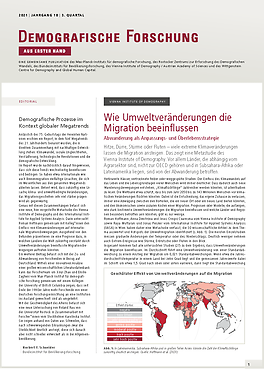September 29, 2021 | Defo News
How Environmental Changes Influence Migration

© MPIDR
The new issue (No. 3/2021) of Demografische Forschung Aus Erster Hand, the popular science newsletter with latest research results from demography, has been released.
The Newsletter is available in German only.
"Demografische Forschung Aus Erster Hand" is a joint publication of the Max Planck Institute for demographic Research (MPIDR), the Rostocker Zentrum zur Erforschung des Demografischen Wandels (RZ), the Vienna Institute of Demography (VID), the Wittgenstein Centre for Demography and Global Human Capital and the Federal Institute for Population Research (BiB).
The topics of the new issue are:
1. How environmental changes influence migration
Emigration as adaptation and survival strategy
(from Vienna Institute of Demography)
Heat, droughts, storms or floods – many of the extreme climate changes observed are driving up migration, shows a meta-study by the Vienna Institute of Demography. Agriculturally dependent countries outside the OECD and located in sub-Saharan Africa or Latin America are especially affected by emigration.
2. Hub of Science
International migration of researchers: negative balance for Germany
(from Max Planck Institute for Demographic Research)
Germany has a lively exchange of scientists, especially from the USA, Great Britain, and Switzerland. On balance, however, the Federal Republic is losing more scientific brains than it is gaining. This is at least suggested by an analysis of the Scopus database, a database covering more than 25,000 scientific publications.
3. In lock step with general aging – inexorably
People who develop cancer do not age faster in succeeding years than healthy people
(from Rostock Center for the Study of Demographic Change)
For people diagnosed with cancer or those who had a heart attack, the risk of dying is known to increase at first. But in the years that follow, mortality does not rise faster than for the rest of the population, shows a new study by the University of Rostock. The mortality rate of cancer patients even converges toward the general mortality level over time.
The newsletter is released four times a year and is available electronically and as a printed version and is free of charge.
All past issues are available online on the Newsletter website. On the website you also have the possibility to subscribe to the Newsletter to get informed about the release of the new issues or to receive the printed versions by mail.